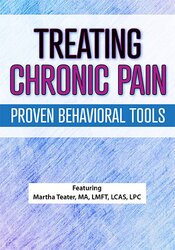

We are in the midst of a nationwide push to treat chronic pain and address our out of control opioid prescribing. At least 1/3 of the people we treat are dealing with this condition, yet most of us are ill-prepared to address this with skill and expertise. The CDC recently published recommendations for the treatment of chronic pain, specifically highlighting behavioral treatment as an approach that should be tried before opioids are prescribed.
We are witnessing a devastating public health crisis that is ruining individual’s lives, tearing up families, and ripping through communities. We need to arm ourselves with the skills needed to offer our clients evidence-based behavioral interventions that will help them live healthy and productive lives.
Watch this interactive and cutting-edge training and learn creative tools and techniques to transform your practice. Learn powerful mindfulness interventions and motivational interviewing techniques to move your clients towards behavior change. Master the four pain-changing CBT tools. You will leave with the skills and confidence to provide practical and life-changing help to help people move out of chronic pain and into active, healthy, and meaningful lives.
This online program is worth 5.75 hours CPD.
| File type | File name | Number of pages | |
|---|---|---|---|
| Manual - Behavioral Treatment of Chronic Pain (3.57 MB) | 88 Pages | Available after Purchase |

Martha Teater, MA, LMFT, LCAS, LPC, is a Diplomate with the Academy for Cognitive Therapy and is a practicing cognitive-behavioral therapist. She has maintained a private practice since 1990 and has worked in primary care settings, free clinics, and medication-assisted treatment programs. Martha is a Red Cross disaster mental health manager and has been on many national disaster deployments where she provides support to traumatized people. She is also involved with the Red Cross Service to the Armed Forces to develop programs to support military and veteran families.
She has provided trainings in the United States and internationally on topics such as evidence-based treatments for trauma, DSM-5®, compassion fatigue, and behavioral treatment of chronic pain. A prolific writer, Martha has published over 175 articles in newspapers and magazines, including Psychotherapy Networker and Family Therapy Magazine. Martha is the co-author (with John Ludgate) of Overcoming Compassion Fatigue: A Practical Resilience Workbook (PESI, 2014) and (with Don Teater) Treating Chronic Pain: Pill-Free Approaches to Move People from Hurt to Hope (PESI, 2017).
Speaker Disclosures:
Financial: Martha Teater maintains a private practice and receives compensation as a consultant. She receives a speaking honorarium, recording, and book royalties from PESI, Inc. She has no relevant financial relationships with ineligible organizations.
Non-financial: Martha Teater is a member of the Academy of Cognitive Therapy and the American Association for Marriage & Family Therapy.
| 5 |
|
| 4 |
|
| 3 |
|
| 2 |
|
| 1 |
|
Satisfaction Guarantee
Your satisfaction is our goal and our guarantee. Concerns should be addressed to info@pesi.co.uk or call 01235847393.
Please wait ...